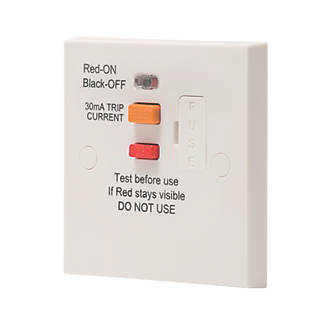Current setup:
House CU contains all re-wirable fuses. No RCD fitted.
Approx. 8mtrs of 2.5mm T&E cable from house (kitchen) to detached garage, clipped at the top of a 2.5m high wall built between house and garage. The cable is believed to be from a spur on the kitchen circuit and also without an FCU (both these points to be confirmed).
Inside the garage the T&E terminates inside a switched FCU located close to the incoming cable entry which controls one ceiling lamp. Within the FCU too is connected a length of 2.5mm T&E that runs along the garage walls to 2x 2-gang power sockets.
Requirements:
1. Add a new switched FCU to the supply cable spurred inside the kitchen (for protection & limited to 13A).
2. Replace the garage lighting FCU (old, plastic) with a metal version.
3. Disconnect the 2.5mm cable between the FCU and the 2x sockets and discard ALL of it (bc old components, messy wiring, wrong sockets location).
4. Add a new metal 2G socket closer to and below the switched FCU (this will be the ONLY socket in garage).
In summary I would like to keep the same single light, update the switched lighting FCU, and add a new 2G socket to allow for the charging of two mobility scooters simultaneously. There is no intention to have any more sockets.
The house CU (all fuse wire) is at the front of the property and the garage cable's spur point is in the kitchen at the opp end of the property so I prefer not to disturb this arrangement due to a lot of work to gain access under floor, walls, etc.
My primary question is what is the appropriate form of (currently non-existent) RCD protection I should add? Should I :
1. Put in a 2G socket with built in RCD such as this: (£16.29) ?
2. Install a garage CU such as this fitted with this. (£33.55) ?
On the one hand a garage CU is double the cost and several forum comments suggest overkill for simple installation power requirements.
But on the other hand might it be useful to have separate MCBs/isolation within the garage?
It seems good to know too that an RCD would protect everything from the point of entry instead of just at the power socket; assuming RCD protection is advantageous to protect the user with the lighting circuit e.g., if a problem arose in a potentially damp garage with condensation??
Also would a garage CU be appropriate to use in conjunction with a 13A FCU spur in the kitchen?
Hope this makes at least some sense!
Cheers
House CU contains all re-wirable fuses. No RCD fitted.
Approx. 8mtrs of 2.5mm T&E cable from house (kitchen) to detached garage, clipped at the top of a 2.5m high wall built between house and garage. The cable is believed to be from a spur on the kitchen circuit and also without an FCU (both these points to be confirmed).
Inside the garage the T&E terminates inside a switched FCU located close to the incoming cable entry which controls one ceiling lamp. Within the FCU too is connected a length of 2.5mm T&E that runs along the garage walls to 2x 2-gang power sockets.
Requirements:
1. Add a new switched FCU to the supply cable spurred inside the kitchen (for protection & limited to 13A).
2. Replace the garage lighting FCU (old, plastic) with a metal version.
3. Disconnect the 2.5mm cable between the FCU and the 2x sockets and discard ALL of it (bc old components, messy wiring, wrong sockets location).
4. Add a new metal 2G socket closer to and below the switched FCU (this will be the ONLY socket in garage).
In summary I would like to keep the same single light, update the switched lighting FCU, and add a new 2G socket to allow for the charging of two mobility scooters simultaneously. There is no intention to have any more sockets.
The house CU (all fuse wire) is at the front of the property and the garage cable's spur point is in the kitchen at the opp end of the property so I prefer not to disturb this arrangement due to a lot of work to gain access under floor, walls, etc.
My primary question is what is the appropriate form of (currently non-existent) RCD protection I should add? Should I :
1. Put in a 2G socket with built in RCD such as this: (£16.29) ?
2. Install a garage CU such as this fitted with this. (£33.55) ?
On the one hand a garage CU is double the cost and several forum comments suggest overkill for simple installation power requirements.
But on the other hand might it be useful to have separate MCBs/isolation within the garage?
It seems good to know too that an RCD would protect everything from the point of entry instead of just at the power socket; assuming RCD protection is advantageous to protect the user with the lighting circuit e.g., if a problem arose in a potentially damp garage with condensation??
Also would a garage CU be appropriate to use in conjunction with a 13A FCU spur in the kitchen?
Hope this makes at least some sense!
Cheers
Last edited:


